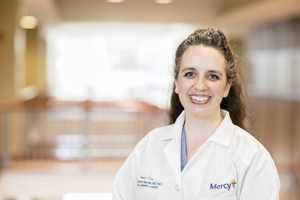

Mercy Clinic physician Lisa Hawver, MD, is an obesity expert.
Being overweight isn’t a lot of fun.
Seats in cars, amusement park rides and offices were made for smaller people. Bigger people often have a harder time finding clothes they love and feel confident wearing. Physical activities that other people take for granted can leave larger people feeling breathless. Stress from excess weight can damage bones and joints, causing chronic pain.
Sadly, many adults with weight issues were children with weight issues, and maybe their weight has stopped them at points throughout their lives from doing the things they really would like to do. It’s also affecting their health.
“As many as 80 percent of overweight adolescents grow up to be obese adults,” said Mercy Clinic physician Lisa Hawver, MD, medical director for Mercy Bariatric Center and an obesity expert.
According to the Centers for Disease Control, childhood obesity has tripled in adolescents in the past 30 years. In 2010, more than one third of children and adolescents were overweight or obese.
“Years ago, it was rare to see kids with risk factors for heart disease such as high cholesterol and high blood pressure, or kids with Type 2 diabetes, now it’s common enough that we screen for those things,” said Dr. Hawver.
Parents should encourage their kids to increase their physical activities and include exercise in their day. They should also help their kids consume fewer calories and choose healthier foods.
But learning a new lifestyle can be hard, especially if it means mean letting go of a source of emotional comfort such as food. One of the best things parents can do is join the change.
“We’re creatures of habit. If we won’t change our habits for ourselves, we’re more likely to do it for our kids. As parents, we can help them learn healthy habits they will take into their adulthoods,” Dr. Hawver said. “Learn about nutrition. Slowly trade unhealthy food choices for healthy ones and add physical activities into the day until they become habits for everyone in the household.”
Dr. Hawver said most people are confused by portion sizes and calories. “They’re convinced they don’t eat that much, they eat healthy, and they just can’t lose weight. When they meet with a nutritionist, it’s an awakening. I think for some people, they realize they have more control than they thought.”
Mercy and other organizations offer exercise and nutrition programs to help people of all ages learn healthier habits.
“I recommend programs for kids and adults who need the group support to keep them motivated. But not everyone needs to join a program. Information is readily available in medical offices, online, and in books,” said Dr. Hawver. “Success requires dedication, discipline and staying focused on your goals, even after a bad day.”
The benefits of maintaining ones ideal body weight are staggering. “Studies have shown that better diets along with exercise not only reduce weight but also reduce risks for heart disease, diabetes, certain cancers, general malaise, and even slow the aging process in adults,” said Dr. Hawver.
Obese adults who have tried and failed to lose weight by traditional means do have surgical options. Bariatric (weight loss) surgery shrinks the stomach permanently or temporarily to help people lose weight faster. It has been proven safe and effective for individuals with weight-related health issues including Type 2 diabetes.
“Bariatric surgery is not a magic pill for weight loss,” said Dr. Hawver. “The surgical procedure is just one aspect of the entire program. There is counseling, exercise and nutrition education, support groups, follow up visits and more. Patients need to dedicate themselves to the program for the surgery to be successful.”
Recently the American Medical Association officially recognized obesity as a disease. This action is considered by many in the medical community as a step toward social and then mainstream acceptance of the condition as one to be studied, treated and prevented.
For information about Mercy’s bariatric services nearest you, visit www.mercy.net/bariatrics.

